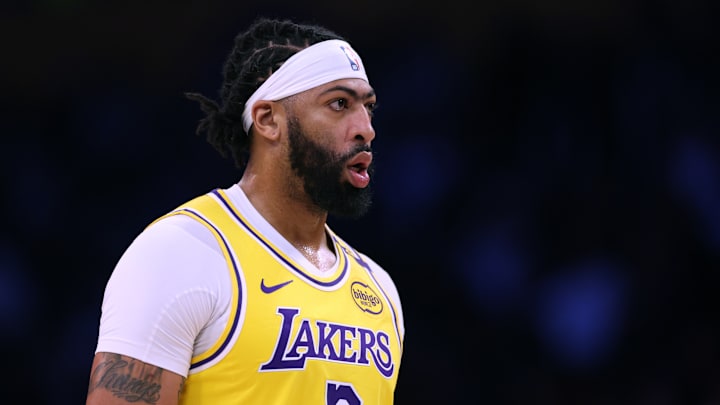After 12 seasons of Hall of Fame play, few are surprised when Anthony Davis dominates a game. He's one of the most consistently great two-way talents in NBA history, providing prolific scoring numbers, nearly unrivaled versatility on defense, and postseason heroics across multiple seasons.
Unfortunately, injuries have robbed Davis of significant time on the court-—and the Los Angeles Lakers are now staring down the complacency in their approach to helping him.
Davis has thus far powered through a foot injury that Shams Charania of ESPN identified as plantar fasciitis. He's appeared in nine of the Lakers' 10 games, playing at an MVP level each time out. Unfortunately, during his most recent appearance, Davis sustained an eye injury.
According to Dave McMenamin of ESPN, Davis saw an ophthalmologist about his eye—the same eye to which he suffered a corneal abrasion last season.
"Sources told ESPN's Dave McMenamin that Davis experienced swelling as a result of the contact, making it difficult to keep his left eye open. Davis will have the eye examined by an ophthalmologist Monday as a 'precautionary' measure, sources said."
These type of injuries are difficult to prevent, if at all possible, but the flaw they exploit is rooted in Rob Pelinka failing to honor Davis' request from more than a year ago.
Anthony Davis has wanted help at center for over a year. Where is it?
It'd be significantly easier to navigate Davis playing at less than 100 percent, or even outright missing a game, if the center position weren't such a question mark. With a proven commodity at the position, the burden carried by the Lakers' MVP candidate would be significantly easier to shoulder.
Instead, Los Angeles will continue to go through each game uncertain of what to expect from the big men beyond Davis—primarily on the defensive end of the floor.
Jaxson Hayes has made noticeable improvements in 2024-25, including his offensive rebounding, shot-blocking, and general intent when putting himself in a position to score. Hayes primarily operates as a rim-runner, however, and his offensive limitations prevent him from thriving in an on-ball capacity.
That would be forgivable if his defensive contributions outweighed those concerns, but even with his improvements, there's a noticeable lack of consistency.
This could've been resolved over a year ago, when Davis informed Pelinka that he would like help at center. Unfortunately, the commitment to a proven commodity hasn't yet been made at the position, and Los Angeles is thus in its current predicament.
Perhaps the Lakers' focus is placed on avoiding the second apron and preserving assets, but with Davis as the franchise player, a stronger balance must be struck.
Davis is 31 years of age, meaning this could be one of the final seasons of his prime. Stephen Curry, Kevin Durant, and LeBron James playing at an All-NBA level deep into their 30s could suggest otherwise, but it's important to view them as the exception rather than the rule.
If the Lakers are serious about helping Davis thrive as their franchise player, then they need to honor the request that could make or break their season.
